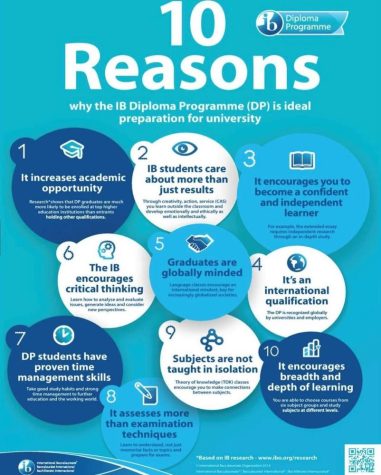
Audrey Folia | Head Editor
September 26, 2024
As the date to drop classes draws nearer, many juniors participating in the international baccalaureate, or IB, program are questioning whether they’re a good fit. The program prides itself on giving students a global mindset that shapes them into multiculturally faceted people. But, with the amount of work it takes to get there, including a Theory of Knowledge class after school on Mondays, biweekly creativity, activity, and service, or CAS, reflections, a CAS project, and a 4,000-word research project, many agree it is a risky use of time since failing to earn enough points on the IB exams means a student couldn’t earn the diploma.
Similar to AP tests, the IB exams are a cumulative assessment of all a student learned over the school year, or over two school years in the case of higher level exams, and are graded by independent reviewers. However, it differs in that it is scored on a scale from 1 to 7, as opposed to the AP scoring of 1 to 5, and has a variety of testing styles. Students must earn 24 out of 42 possible points, but earning a three or below on even one of the tests means a student will not earn the diploma. This creates a stressful environment for diploma candidates who worry that they could go through the entire program only to fail their last test and not earn the diploma.
But, the potential for failure isn’t the only stressor in the lives of IB students as the program is known for its rigorous workload. Junior Natalie Deyhimy, a varsity cross country runner, states she’s “concerned over not having enough time” as she spends 10 hours running during the school week, not including the time she spends racing on Saturdays. So, she takes comfort in the idea that she “can always drop if it becomes too much.”

With the stress of the program combined with the rigorous workload, many students are left wondering: Is the IB program really worth it? IB diploma candidates argue that even in spite of the challenges, the benefits of the program outweigh the potential costs. Junior Macie Armbruster loves “how IB offers different perspectives on things” she didn’t “always consider to be a debate,” such as why a map is drawn the way it is and how one retains knowledge. Also, most are optimistic about the 79% pass rate and don’t mind that CAS projects require them to do things they would already like to be doing, such as exercising or volunteering.
Also, looking toward the future, the increased percentage of college acceptance for IB students is very appealing to most candidates. Top universities often have significantly higher acceptance rates, such as Cornell University having a 7.5% acceptance rate for non-IB diploma holders and a 47% acceptance rate for IB students, or UCLA having a 9% acceptance rate for those without and a 48% for those with. However, there are still some schools that don’t value the program as heavily, such as Stanford still only having a 17% acceptance rate for IB students. Also, many question if it is truly the IB program giving the students such a boost or the fact that IB students tend to be high-achieving with many extracurriculars that could get them into colleges anyway.
So, with so many various perspectives to look at the IB program from, it really is up to each individual student to evaluate the pros and the cons, and whether or not they have what it takes to be an IB diploma student.

Leave a Reply